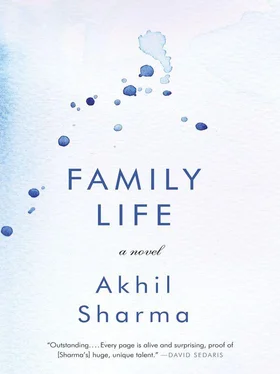Talking, talking, talking, I slowly began to get calmer.
THE NEXT MORNING, as I walked down the street to the corner where the school bus stopped, I pictured Birju the way I had left him, in his quiet, dim room, snoring on his back, his mouth open. I saw my mother, too. She was in the laundry room, stuffing the washing machine with the sheets and pillowcases from last night. Not only was I luckier than my brother, but I was also more fortunate than my mother. I wanted to shriek. While a part of me was glad I wasn’t like my brother, no part of me wished to be more fortunate than my mother. To be luckier than her was to be different from her, it was to be apart from her, it was to have a life that would take me away from her.
At school, the guilt and sadness were like wearing clothes still damp from the wash. Whenever I moved, I felt as though I were touching something icy. In history class, I sat in the first desk of the fourth row. I learned that Andrew Jackson was called “Old Hickory.” My knowing this meant that I had gained something, that I was being made rich while my mother and brother remained poor.
In school, there were twenty Indians among the five hundred or so students. Three or four of them spoke without accents and bought lunch or brought American-style sandwiches. The rest of us sat at the same long table in the cafeteria, the girls at one end and the boys at another. The white and black children abused us. Boys would walk past us and call, “Shit! I smell shit!” In my guilt and shame, I wanted to fight, to be nothing like myself. I shouted insults. “I fucked your mother in the ass. That’s what you’re smelling.”
Once, a boy leaned over my shoulder and demanded to know what I was eating. I said I was eating snake. The boy believed me. He began shouting, “snake”. A crowd gathered around me. I felt boys pressing against my back. Other boys stood on the benches of the long tables.
The vice principal, a short white-haired man, appeared. “What are you eating?” he demanded.
“Okra,” I said.
“Come with me.” He led me through the crowd, pushing the boys out of his way. He took me to detention hall, a room with white cinder block walls.
The recent immigrants at the lunch table found me annoying. They saw me as a troublemaker for responding to the insults. To them, I was a show-off for not keeping quiet. This was true to an extent. Part of my motivation for fighting was that I did not want to be like the recent immigrants and so I was deliberately trying to be different. There were other ways that I was a show-off too. I often reminded the boys I sat with that I was in more advanced-level classes than they were. Sitting with these children, a part of me was surprised that not all Indians were smart.
Often in the evening, my mother and I would leave the house and go for walks. As we went down sidewalks, cars would drive past us and people would shout curses; haji, Gandhi, sand nigger. The first time this happened, I, for some reason, thought my mother would not understand that we were being cursed and so I told her that these were people I knew from school, that they were calling out to me in greeting. My mother nodded as if she believed me.
I began not wanting to go on these evening walks. When we did go, I carried stones in my pocket.
Weeks passed. The weather got colder. The days tipped backward into darkness. Some evenings our house and street appeared dark while the sky was light. In October the trees shed their leaves, and our house stood undefended on its lawn.
THE WORST THING about our new life with Birju was worrying about money. Now that I was going to school and the miracle workers had mostly stopped coming, we needed to hire a full-time nurse’s aide during the day. We decided not to use the agency because the agency charged almost twelve dollars an hour and we thought we could get someone much cheaper. My father put advertisements in the local newspaper. The ads said that pay was based on experience.
A Filipino aide with long black hair came to be interviewed. She stood by the exercise bed. When she learned how much my mother intended to pay, she shouted, “Why not you tell me on the phone? Why you make me drive so long? You do this to a black, she burn your house down.”
My heart jumped when she shouted at us. At the same time, I felt that it was OK to be shouted at as long as we did not spend the extra money.
The cold weather affected our plumbing. Some of our water came from a well. When the white washing machine shook and churned, the dim laundry room filled with a marshy smell.
In the kitchen one night, standing at the stove, my mother yelled, “I don’t care how much it costs.”
“You don’t care because you don’t pay the bills,” my father yelled back.
“What are we going to do now?”
“You were the one to say buy the house. We’ve gotten cheated.” The kitchen was very bright. My father said the new plumbing might cost five thousand dollars. The room hung reflected in the windows. My father started crying. I was stunned. What did it mean to spend five thousand dollars? The house had cost eighty-four thousand. I wondered if, in America, one could return a house the same way that one could return a belt to a store.
We also worried about the insurance. The insurance company said no to everything. They said no to the Isocal formula. They said no to the disposable blue pads that we put under Birju for when he soiled himself. They said no to the nurse’s aides. On Saturday and Sunday afternoons, my father sat at the kitchen table and filled out insurance forms. On the table were rubber-banded stacks of letters, a stapler, his checkbook, and a yellow legal pad on which he wrote letters to the insurance company. My mother and I always kept very quiet while my father did this work.
SEVENTH GRADE WAS the first time we were divided into honors-level classes and accelerated levels and track one and track two. This was when I began to think that I was smart enough. I didn’t think I was very smart — only that I had enough intelligence to get by. Even the idea of being smart upset me; it made me angry. I came home with my grades from the first quarter and saw Birju lying on his exercise bed and wondered what the point of all As was. Still, I was glad to be better than other boys.
My classes had mostly Jews, a few Chinese, and one or two Indians. The Indians were not Indian the way I was. They didn’t have accents. They were invited to birthday parties by white children.
I preferred talking to the Jews over the Chinese or the Indians. The Jews were white, and so they seemed more valuable than these others. Also, with the Chinese and the Indians, I sensed they watched me with suspicion the same way I watched them, that since they knew immigrants, they understood that I was untrustworthy, that immigrants are desperate and willing to do almost anything.
ONE VERY COLD night in November, our front doorbell rang. We opened the door, and a jowly man was standing outside. Behind him was a tall boy in a long winter coat. We had met the man at temple, but we didn’t know him well. We invited them in.
In the kitchen, the man stood wearing his ski jacket and in his stocking feet. The SAT was that weekend, and he asked my mother to bless his son. “Put your hand on his head, and it will be done.” He spoke in a jolly tone, which was intended to make him seem simpleminded, someone with whom there was no point in arguing.
My mother looked surprised. She remained standing even though the polite thing would have been to sit so the man would know that we wanted him to stay. “Ji, what use is this?” she said. When people visited our house, they often asked my parents to bless their children. This was just out of politeness, though. I too often touched people’s feet to show respect. What the man was doing was different. He was asking for a blessing so that something specific would occur and this felt closer to us being treated like we were holy.
Читать дальше












